 |
Arch 484/684: Architecture and Film Fall 2002: Course Home Page
|
| Terri Meyer
Boake B.E.S. B.Arch. M.Arch. Associate Professor School of Architecture University of Waterloo |
 |
Arch 484/684: Architecture and Film Fall 2002: Course Home Page
|
![]()
Course
Description: |
| Film Name and Details | Reviews: | |
Theme 1: Early Film and Its Vision of the Architecture of the Future: |
All of the internet reviews below were active as of August 2002. | |
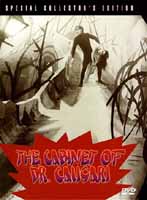 |
The Cabinet of Doctor Caligari (1920) (72 minutes) The film that forged the dark, ominous cinematic movement known as German Expressionism - and influenced vanguard filmmakers for generations. Werner Krauss stars as a deranged hypnotist who spreads death through the countryside from a ramshackle traveling carnival. In making the film Robert Wiene and designers combined techniques of painting, theatre and film to conjure a nightmare world of splintered reality ... boldly creating a visual representation of insanity .. taking the art of cinema a lengthy stride into unexplored stylistic and psychological terrain, hinting at the terrifying power the medium might possess. |
http://www.film.u-net.com/Movies/Reviews/Cabinet_Caligari.html http://www.geocities.com/Hollywood/Set/9078/cindex.htm http://www.mdle.com/ClassicFilms/FeaturedVideo/video178.htm http://victorian.fortunecity.com/cloisters/511/classics/noir/caligari1.html |
Student Reviews:
|
||
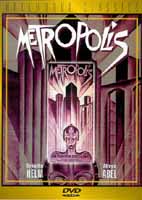 |
Fritz Lang’s Metropolis (1926) (115 minutes) Fritz Lang's most famous silent film uses science fiction and spectacular special effects to tell a story of biting social criticism. In a futuristic time and place, an above ground city of lightness, culture and respectability is kept going only by the enslaved proletariat laboring beneath in the underground city: a nightmarish, cruel and dark place. An innovative and influential film in its day and now considered one of the hippest films of the sci-fi genre. |
http://shipofdreams.net/sfmovies/metropol.htm http://www.kino.com/metropolis/ http://www.uow.edu.au/~morgan/Metroa.html http://www.activitaly.it/immaginicinema/metropolis.html http://www.silentera.com/DVD/metropolis-cmhDVD.html |
Student Reviews:
|
||
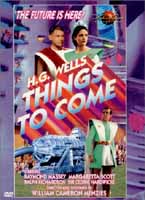 |
H. G. Wells’ The Shape of Things to Come (1936) (97 minutes) One of the most important science fiction films of all time, it opens prior to World War II and takes the viewer on a hundred year time trip to 2036 A.D. when a man and woman are rocketed to the moon. This inspired saga predicts television, jet planes and evil dictators. Featuring fabulous sets, a rich musical score and sweeping visual grandeur. Visionary science fiction novelist H.G. Wells teams up with ace producer Alexander Korda to produce this landmark motion picture epic. |
http://www.csie.ntu.edu.tw/~ntucs82/PEOPLE/b2506017/sf/1f.html http://icg.harvard.edu/~lit107/Film_Resources/Things_to_Come.htm http://tatooine.fortunecity.com/herbert/305/sfm30-364.htm http://www.wikipedia.com/wiki/H.G.+Wells http://www.kirjasto.sci.fi/hgwells.htm |
Student Reviews:
|
||
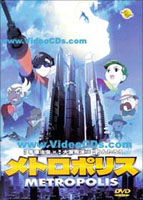 |
Osamu Tezuka’s Metropolis (Japanese Anime 2001) (109 minutes) "Metropolis is the new milestone in anime. It has beauty, power, mystery and above all... heat. Images from this film will stay with you forever." James Cameron In the industrial tri-level world of Metropolis, Duke Red is a powerful leader with plans to unveil a highly advanced robot named Tima. But Duke Red's violent son Rock distrusts robots, and intends to find and destroy Tima. Lost in the confusing labyrinth of Metropolis, Tima is beginning a friendship with the young nephew of a Japanese detective. But when Duke Red separates the two innocents, Tima's life - and the fate of the universe - is dangerously at stake. |
http://movies.yahoo.com/shop?d=hv&id=1807599215&cf=info http://www.startribune.com/stories/412/2003304.html http://www.barcelonareview.com/27/e_sitges.htm http://www.npr.org/programs/morning/features/2002/jan/ metropolis/020124.metropolis.html http://www.sonypictures.com/cthv/metropolis/ |
Student Reviews:
Masters Research Paper:
|
||
|
On Your Mark (Studio Ghibli 1995) In a futuristic Megacity,
a pair of Policemen take part in a raid on a religious cult’s temple.
While searching through the rubble they find a starved and weak young
girl, with angelic wings. Though they revive her, she is carted off by
a biohazard unit, and put under examination. After much deliberation,
they realize that she has simply gone from one prison into another. Together
they hatch a plan to free the girl, and show her the blue sky she belongs
in. You would think that by that synopsis, and the stunning pics, that
this was a one-shot hour-long feature film. And if you did so, you would
be mistaken. Done back in 1995, and paired up in theatres with Mimi
wo Sumeseba, this animated short was the music video presented for
the popular Japanese music duo, Chage & Aska. Running only six minutes,
forty seconds long, and featuring not a word of dialogue, this animated
short manages to tell a touching and amusing story, with only music and
imagery to guide it along. The animation is crisp, as all Ghibli fare,
but the music is every bit as fantastic as the visuals; Chage & Aska
are no J-POP idols of the week, they’ve been around for a good long
while, and as such know how to SING. I rate this right beside Mononoke
Hime for best of all time simply because of what it achieves, with
so little to work with. |
http://www.nausicaa.net/miyazaki/oym/faq.html http://carnage.fanfic.org/onyourmark.html http://ghibli.epistream.com/on_your_mark/ http://www.animetheme.com/animetheme_n6.html? http://www.animetheme.com/mononoke/on_your_mark.html http://www.theroseking.net/animehub/onyourmark.html http://www.ex.org/2.7/17-anime_onyourmark.html
|
Student Reviews:
|
||
| Theme 2: Modern Film and its Vision of Architecture of the Future | ||
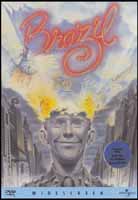 |
Terry Gilliam’s Brazil (1985) (2 hours 30 minutes) Brazil is a surrealistic nightmare vision of a "perfect" future where technology reigns supreme. Everyone is monitored by a secret government agency that forbids love to interfere with efficiency. Johathan Pryce and Robert De Niro star with Michael Palin in this chilling black comedy directed by former Monty Python member Terry Gilliam. When a daydreaming bureaucrat becomes unwittingly involved with an underground superhero and a beautiful mystery woman, he becomes the tragic victim of his own romantic illusions.
|
http://www.mrqe.com/lookup?^Brazil+(1985) http://www.suntimes.com/ebert/ebert_reviews/1986/01/38231.html http://www.trond.com/brazil/ http://www.smart.co.uk/dreams/ http://www.imagesjournal.com/issue06/features/brazil.htm http://members.aol.com/morgands1/closeup/indices/gillindx.htm http://membres.lycos.fr/brazil/GB/indexgb.htm http://www.faqs.org/faqs/movies/brazil-faq/ |
Student Reviews: Edward Hosken link Masters Research Paper:
|
||
 |
Blade Runner (1991) (117 minutes) Rick Deckard (Harrison Ford) prowls the steel and microchip jungle of 21st century Los Angeles. He's a "blade runner" stalking genetically made criminal replicants. His assignment: kill them. Their crime: wanting to be human. The story of Blade Runner is familiar to countless fans. This cut is director Ridley Scott's own vision of his sci-fi classic. This new version omits Deckard's voiceover narration, develops in slightly greater detail the romance between Deckard and Rachael and removes the "uplifting" finale.
|
http://www.brmovie.com/ http://s.webring.com/hub?ring=bladerunner http://scribble.com/uwi/br/off-world.html http://www.ozcraft.com/scifidu/blade_runner.html http://www.trussel.com/f_blade.htm http://apolloguide.com/mov_revtemp.asp?CId=2301 http://www.filmsite.org/blad.html http://www.blade-runner.it/ |
Student Reviews:
Masters Research Paper:
|
||
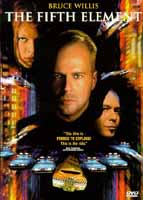 |
The Fifth Element (1997) (126 minutes) Bruce Willis, Milla Jovovich and Gary Oldman star in acclaimed director Luc Besson's outrageous sci-fi adventure. An extravagantly styled tale of good against evil set in an unbelievable twenty-third century world.
|
http://www.ozcraft.com/scifidu/5thelmnt.html http://www.geocities.com/Hollywood/Set/8452/5thelement.html http://www.fifthelement.com/ http://www.all-reviews.com/videos-2/fifth-element.htm http://www.thefifthelement.com/ |
Student Reviews:
Masters Research Paper:
|
||
| Theme 3: The Architecture of Outer Space | ||
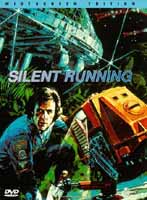 |
Silent Running (1971) (90 minutes) As this science fiction classic opens, botanist Freeman Lowell (Bruce Dern) has spent 8 years aboard the space freighter "Valley Forge" preserving the only botanical specimens left from Earth under huge geodesic domes. When he receives orders to destroy the project and return home, Lowell rebels and hijacks the freighter, while plunging the craft into the gaseous rings of Saturn. From that moment on he has only the trees, the gardens and two drone robots to keep him company on his greatest adventure of all. You HAVE to think of this film as a "period" piece. It immediately preceded Star Wars and many of the people working on the sets for Running were also involved in Star Wars. It also speaks to a political time where the world is still involved in the Vietnam War and the US and Russia are still taunting each other with nuclear weapons. The budget was a mere $1M.
|
http://www.barbeefilm.com/tmsr01.htm http://shipofdreams.net/sfmovies/silent.htm http://german.imdb.com/Title?0067756 http://ofcs.rottentomatoes.com/movie-1018996/reviews.php http://www.movieactors.com/ScienceFiction/sa18.htm http://www.stomptokyo.com/movies/silent-running.html |
Student Reviews:
Masters Research Paper:
|
||
 |
Stanley Kubrick’s 2001: A Space Odyssey (1968) (148 minutes) 2001: A Space Odyssey is a countdown to tomorrow, a road map to human destiny, a quest for the infinite. It is a dazzling, compelling drama of man vs. machine, a stunning meld of music and motion. To begin his voyage into the future, Kubrick visits our prehistoric ape ancestry past, then leaps millennia into colonized space, and ultimately whisks astronaut Bowman into uncharted realms of space, perhaps even into immortality. And meet HAL. Douglas Trumball, who is involved in the sets for this film, goes on to direct Silent Running and then become involved in the Star Wars saga. |
http://www.strafe.com/2001/ http://www.kubrick-web.co.uk/2001.htm http://www.kubrick2001.com/ http://www.britmovie.co.uk/directors/s_kubrick/filmography/003.html http://www.palantir.net/2001/ http://www.elstree.co.uk/2001.html |
Student Reviews:
Masters Research Paper:
|
||
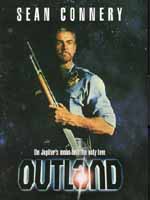 |
Outland (1981) (110 minutes) Io, Jupiter's innermost moon, hosts mining colony Con-Am 27, a high-tech hellhole. There Marshall O'Neil probes some mysterious deaths, among the miners. In pursuit of the truth, he is alone. In Outland, writer/director Peter Hyams depicts a chilling extension of today's corporation-driven world. Dehumanization is vividly evoked in the environments of production designer Phillip Harrison and special-effects wizard John Stears. |
http://www.epinions.com/mvie_mu-1015808 http://www.sfworld.onlinehome.de/outland.htm http://www.rottentomatoes.com/click/movie-1015808/reviews. php?critic=all&sortby=default&page=1&rid=281180 http://w1.860.telia.com/~u86014447/outland.html |
Student Reviews:
Masters Research Paper:
|
||
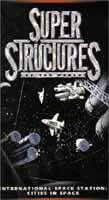 |
Super Structures: The Making of the International Space Station (2000) (52 minutes) Modern civilization has been built by the unlimited imaginations of those who have been undaunted by what seems to be insurmountable obstacles and challenges. In 1998 construction began 250 miles above the earth on the International Space Station. Astronauts have been doubling as construction workers on one of the largest projects ever conceived. It will take 45 space missions to provide the materials necessary to build the station. In the end it will weigh over 1 million pounds and cover the size of two football fields. |
|
| Other Miscellaneous Links: | ||
http://hubcap.clemson.edu/~sparks/sffilm/indexsff.html (fantastic sci-fi film course homepage from Clemson University -- great links and reading references for a wide range of films) http://www.sciflicks.com/movies_by_title.html http://www.geocities.com/Hollywood/Lot/2976/SF_FilmResources.HTML http://www.lib.berkeley.edu/MRC/Scififilm.html http://shipofdreams.net/sfmovies/movielinks.htm
|
||
|
|
||
Pedagogic Objectives: Completion
Requirements: There will be 2 assignments. Assignment #1: The
Review 30% Assignment #2: (B.Arch.)The
Video 70% Alternate Assignment
#1: (M.Arch.)Research Essay60% (M.Arch Video is worth 40%)
References: I purchased most of these books through amazon.com. Students in the course are welcome to borrow any of the titles for a limited time for use in preparing their presentations, web reviews or research papers. Deitrich Neumann, editor. Film Architecture from Metropolis to Blade Runner. Prestel, 1999. Mark Lamster, editor. Architecture and Film. Princeton Architectural Press, 2000. Donald Albrecht. Designing Dreams: Modern Architecture in the Movies. Hennessey + Ingalls, Santa Monica, 2000. Maggie Toy, editor. A.D. Architectural Design Profile no. 112. Architecture and Film. Academy Group Ltd. 1994. Bob Fear, editor. A.D. Architectural Design Profile no. 143. Architecture + Film II. Wiley-Academy. January 2000. Bob Fear, editor. A.D. Architectural Design Profile no. 150. Architecture + Animation. Wiley-Academy. 2001. Francois Penz, editor. Cinema & Architecture: Melies, Mallet-Stevens, Multimedia. British Film Institute, 1997. Thomas Hine. Movie Houses. Architectural Record. 04.02. Terry Smith, editor. Impossible Presence: Surface and Screen in the Photographic Era. University of Chicago Press, 2001. Bizony, Piers. 2001: filming the future. Aurum Press Limited. London. 1994.
last updated
August 30, 2011
|